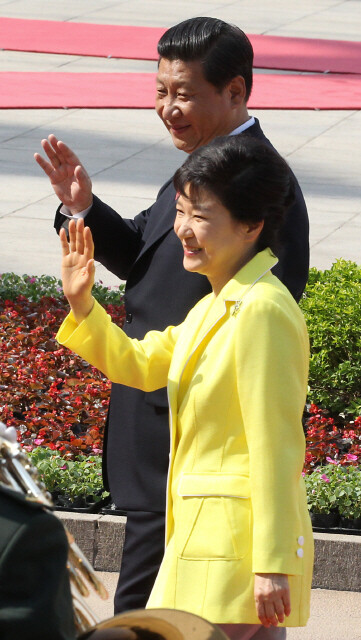hankyoreh
Links to other country sites 다른 나라 사이트 링크
[Editorial] S. Korea-China summit success depends on nuclear issue progress

President Park Geun-hye will hold a summit in Seoul on July 3 with Chinese President Xi Jinping. It comes at a time when various recent conflicts in Northeast Asia have left the two countries playing increasingly important roles. One area where particular action is needed is in discussing solutions on the North Korean nuclear issue - including getting the six-party talks back on track quickly - and coming up with some more fully developed plans.
When it comes to the nuclear issue, both countries agreed in foreign ministers’ talks in late May on the “urgent need to resume meaningful dialogue” toward “making practical advancements in North Korean denuclearization and preventing North Korea from advancing its nuclear capabilities.” Since then, their differences have become apparent, with Seoul insisting that any meaningful dialogue requires a change in attitude from Pyongyang, and Beijing calling for a resumption of dialogue with the aim of getting the six-party talks going again. One major task for this week’s summit will be coming up with ideas for talking both North Korea and the US into returning to the talks. Never mind reaching some kind of turning point, things stand to only get worse with the nuclear situation if the two sides can’t bridge their differences, or if the best they can do is some kind of vague compromise. North Korea’s recent short-range missile launches, and its June 30 request for Seoul to halt its “hostile activities,” only go to show how much is on the line this week.
Another issue is what they can do to quiet and help resolve the various conflicts that are unfolding in the region: the US and Japan vs. China, South Korea and China vs. Japan, and China vs. most of the countries of Southeast Asia. This is an area where a sense of balance from Seoul is key. While we may be able to coordinate with Beijing against Tokyo on troublesome historical issues, we also need to ask that China give more consideration to its neighbors in its regional expansionism. Before deciding on South Korea’s participation in China’s vision for an Asian Infrastructure Investment Bank (AIIB), it would be worthwhile for President Park Geun-hye to consider linking it to the Northeast Asian Development Bank idea, which was proposed as a way of support North Korean infrastructure development.
South Korea and China have made huge strides since establishing diplomatic ties in 1992. Trade has gone from US$5 billion a year then to nearly US$300 billion now. The fact that Xi chose to visit Seoul first rather than Pyongyang after becoming China’s leader shows that Beijing wants a stronger relationship. At the June 2013 summit in Beijing, the two countries agreed to further develop their “strategic cooperative partnership.” This summit needs to be a stepping stone for developing that framework and ushering it to the next plateau.
A good relationship between South Korea and China is a strong driving force for promoting stability, peace, and cooperation in Northeast Asia. Right now, the big issue that the two sides have to address is the North Korean nuclear program. It will also be the judge of whether this summit is a success or not.
Please direct questions or comments to [english@hani.co.kr]

Editorial・opinion
![[Column] Season 2 of special prosecutor probe may be coming to Korea soon [Column] Season 2 of special prosecutor probe may be coming to Korea soon](https://flexible.img.hani.co.kr/flexible/normal/500/300/imgdb/original/2024/0426/3317141030699447.jpg) [Column] Season 2 of special prosecutor probe may be coming to Korea soon
[Column] Season 2 of special prosecutor probe may be coming to Korea soon![[Column] Park Geun-hye déjà vu in Yoon Suk-yeol [Column] Park Geun-hye déjà vu in Yoon Suk-yeol](https://flexible.img.hani.co.kr/flexible/normal/500/300/imgdb/original/2024/0424/651713945113788.jpg) [Column] Park Geun-hye déjà vu in Yoon Suk-yeol
[Column] Park Geun-hye déjà vu in Yoon Suk-yeol- [Editorial] New weight of N. Korea’s nuclear threats makes dialogue all the more urgent
- [Guest essay] The real reason Korea’s new right wants to dub Rhee a founding father
- [Column] ‘Choson’: Is it time we start referring to N. Korea in its own terms?
- [Editorial] Japan’s rewriting of history with Korea has gone too far
- [Column] The president’s questionable capacity for dialogue
- [Column] Are chaebol firms just pizza pies for families to divvy up as they please?
- [Column] Has Korea, too, crossed the Rubicon on China?
- [Correspondent’s column] In Japan’s alliance with US, echoes of its past alliances with UK
Most viewed articles
- 1No good, very bad game for Korea puts it out of Olympics for first time since 1988
- 2[Column] Season 2 of special prosecutor probe may be coming to Korea soon
- 3Korea’s 1.3% growth in Q1 signals ‘textbook’ return to growth, says government
- 4‘We must say no’: Seoul defense chief on Korean, USFK involvement in hypothetical Taiwan crisis
- 5Is N. Korea threatening to test nukes in response to possible new US-led sanctions body?
- 6Division commander ordered troops to enter raging flood waters before Marine died, survivor says
- 7[Column] ‘Choson’: Is it time we start referring to N. Korea in its own terms?
- 8Will NewJeans end up collateral damage in internal feud at K-pop juggernaut Hybe?
- 9Korea sees more deaths than births for 52nd consecutive month in February
- 10[Editorial] Korea’s surprise Q1 growth requires objective assessment, not blind fanfare